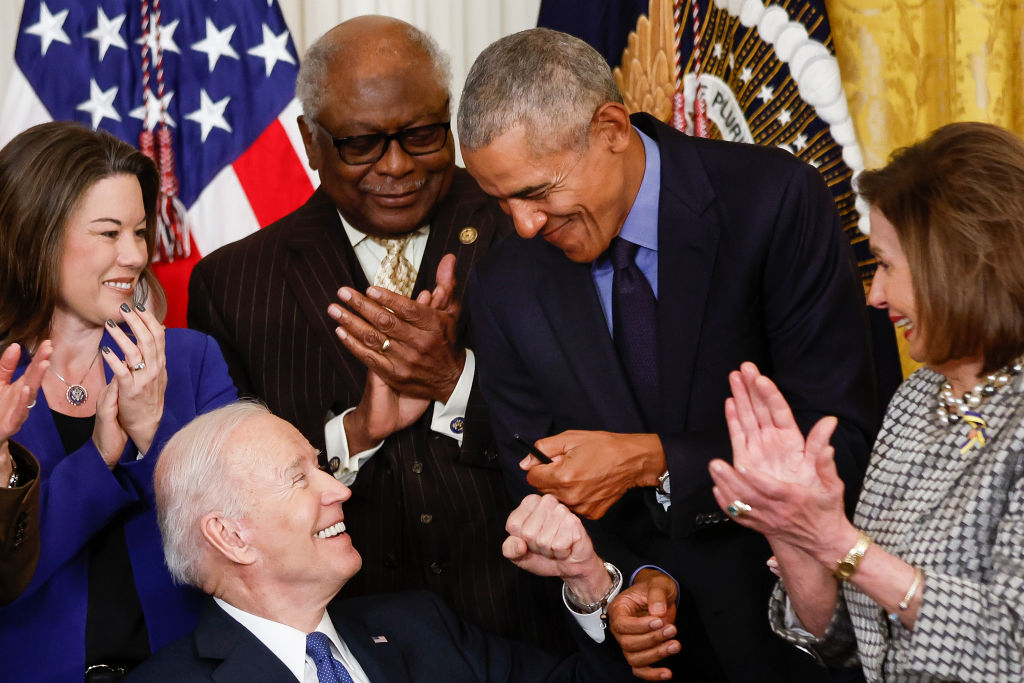Fifteen years ago, when Congress enacted the Patient Protection and Affordable Care Act (also known as Obamacare), Vice President Biden, at that time a man with full verbal faculties, indecorously stated to President Obama, “this is a big fuckin’ deal.” So it was, or so it seemed. Today however, Obamacare has become yet another reckless source of federal spending, significantly contributing to the inefficiencies and corporatist structure of American healthcare.
Obamacare’s reinforcement of the healthcare status quo should lead us to think more deeply about what we want healthcare to be like in America. Should we not strive for the alignment of healthcare with the fundamental principles of democratic capitalism, ensuring that freedom and accountability for patients – i.e. consumers, doctors and healthcare entrepreneurs, are the norm?
In 2025, it is hard to argue that Obamacare has fulfilled the grand objectives that were claimed to be its birthright. Healthcare prices have increased for all Americans; federal spending on healthcare hasn’t declined but has instead soared. While Obamacare has reduced the number of uninsured Americans, the costs associated with it have been extensive. The Congressional Budget Office projected in 2023 that Obamacare will cost $2.5 trillion over the next decade (2024-2033). Expanding Medicaid, we were told, was the least expensive way to expand healthcare insurance. But the cost for these new enrollees is 60 percent higher than anticipated, due in large part to improper Medicaid enrollments.
The enrollment of millions of able-bodied working-age adults into Obamacare has happened because the federal government reimburses the 40 states participating in Obamacare at a 90 percent rate for the healthcare expenses of this “newly eligible” population. Other traditional members of the Medicaid population receive federal reimbursements at a much lower rate, typically 55-70 percent. This translates to a state receiving a 9-1 reimbursement ratio for the healthcare expenses of an unemployed 30-year-old male versus the reduced rate for a disabled child. Predictably, states that receive this more generous match have geared their programs to serve the needs of able-bodied, low-income adults.
In addition, conservatives have failed to offer a free market alternative, and have avoided calling for Obamacare’s repeal since their failure to annul it in 2017. In this double omission, they have allowed progressives to define the healthcare market as incapable of operating independently outside of government. Worse, certain conservatives now join progressive voices to say that increasing numbers of Americans should be placed in Obamacare. Should this happen, the consequences for the nation’s finances, freedom of healthcare choices and healthcare innovation are starkly negative.
The last four years have been particularly worrisome regarding subsidized marketplace insurance premiums, and reimbursements to states for Obamacare enrollees. Enrollment in Obamacare has doubled since 2021 (from 12 million to 24 million). Federal spending on the program was $43 billion in 2019 and is projected to be $143 billion in 2025. Obamacare’s net costs between 2017 and 2026 are estimated to be $1.4 trillion.
Ballooning costs, inefficiencies and a generally defective healthcare system were not really addressed in the latest attempts to trim Obamacare’s sails in the most recent version of the One Big Beautiful Bill Act. Today, many politicians on both sides of the aisle are loath to admit that the primary goal of Obamacare was not to revolutionize the American healthcare system, but instead to fully integrate the system into the government’s care. How better can you explain the extension of government insurance, subsidies, and federal-state reimbursements for able-bodied adults?
The leitmotif is that the government provides a form of security. However, the correct way of looking at it is to catalogue the loss of healthcare choices and the encroachment of the state, this time allowing your body to become a ward of democracy.
There is a place for a welfare net in our capitalist democracy. But it should be an exception, one made for those suffering from disability or incapable of working. Obamacare’s structural principles are to make all of us, incrementally, part of the exception. But why should Americans accept a broken system that has been decades in the making?
Healthcare in America shifted toward a third-party payer system during the New Deal, when employers were prohibited from raising wages and began to offer benefits, including healthcare, to keep and attract employees. That arrangement was later ratified with favorable tax treatment for companies that can fully deduct from their taxes the costs of paying employee insurance premiums. Individual consumers still don’t receive this tax favorability when they try to buy individual coverage on the open market, and are unable to deduct these expenses from their taxes.
However, a third-party payer system, whether it’s private insurance companies or the government picking up the bill, is not a system open to dynamic prices – the essential traffic signal for capitalism. Patients, that is, consumers, generally don’t know how much services cost and how that data should inform their decisions. Obamacare only makes this dysfunctional process worse.
The conservative position should be to expand the principles of price transparency, consumer choice and tax neutrality as the foundations of the American healthcare market. For those who are disabled, sick and otherwise unable to pay, public provision can and should be made for their care. But the difference becomes very clear here.
Healthcare should be oriented towards freedom and responsibility, allowing doctors, patients, and investors in healthcare products and services to take the lead, with the government providing backstop support for those who are otherwise unable to pay. Not only is this affordable, but it’s also a system that will move qualitatively ahead in terms of care, technology and transparency, just like every other part of our economy that’s subject to prices, competition, and accountability.
Americans are stuck in the middle of their insurance companies, their employers and their government, maneuvering amongst them for the best deal. Why don’t we put people in charge instead and bid adieu to Obamacare?


























Leave a Reply